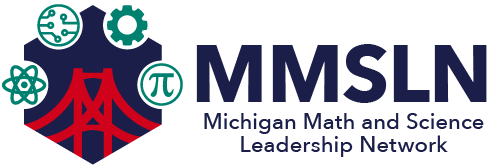
Fostering equitable mathematics and science learning experiences for all students.
Michigan Mathematics and Science Leadership Network was approved for the PLPG in July 2023.
The "Types of support we offer" and "Our curriculum expertise" are evaluated and approved by Rivet Education; all other information is self-reported. We recommend that you confirm details with each partner directly.
Who we are
Types of support we offer
Rivet Ed approved

- Adopting an ELA curriculum
- Adopting a math curriculum
- Adopting a science curriculum
- Launching a curriculum
- Ongoing support for teachers
- System design and leadership support
Our curriculum expertise
Rivet Education approved

Math
- Imagine Learning Illustrative Mathematics 6-8 Math (2019)
- Imagine Learning Illustrative Mathematics 9-12 (2019)
- Kendall Hunt's Illustrative Mathematics 6-8 Math (2019)
- Kendall Hunt's Illustrative Mathematics Traditional (2019)
- McGraw-Hill Illustrative Mathematics 6-8 Math (2020)
Science
- OpenSciEd (2017)
Our team
21–50 facilitators/coaches
11-25% are non-white
Where we work
We have worked here
We are also willing to work here
Types of districts that we have experience working with
- Traditional District
- Charter
- Private
- Parochial
- Urban
- Rural
- Suburban
- Fewer than 2,500 students
- 2,500 to 10,000 students
- 10,000 to 50,000 students
- 50,000 to 100,000 students
- More than 100,000 students
- Greater than 60% of economically disadvantaged students
- Greater than 20% of English language learners
- Greater than 20% of students with disability
- Greater than 80% students of color
This partner's approach and services
How we address equity
How we build district capacity
How we provide curriculum-aligned PL
Workshops
The district and MMSLN's mathematics/science coordinators collaboratively identify a particular workshop offered in the IM K–12 Math™ Professional Learning catalog that attends to teacher and/or leader's immediate needs. A workshop is a half-day learning module and half-day connected PLC to act on the learning from the module.
Coaching
The district and MMSLN's mathematics/science coordinators collaboratively identify instructional goals for teachers. From there, we schedule individual and grade level coaching cycles to meet the goals. Coaching plans include individual, small group, and departmental rounds, focused on a particular instructional challenge or next step connected to the identified instructional goals.
PLCs
The district and MMSLN's mathematics/science coordinators collaboratively build a PLC agenda focused on a particular instructional challenge or next step connected to teaching and learning. Together, we identify the learning goals for the PLC and ensure they are connected to prior learning while attending to advancing teacher instructional practice.
Consultations
The district and MMSLN's mathematics/science coordinators collaboratively identify a particular instructional challenge or next step connected to teaching and learning and the implementation of the curriculum. Together, we identify the professional learning structures that are best suited to the learning; workshop, PLCs, or coaching.


